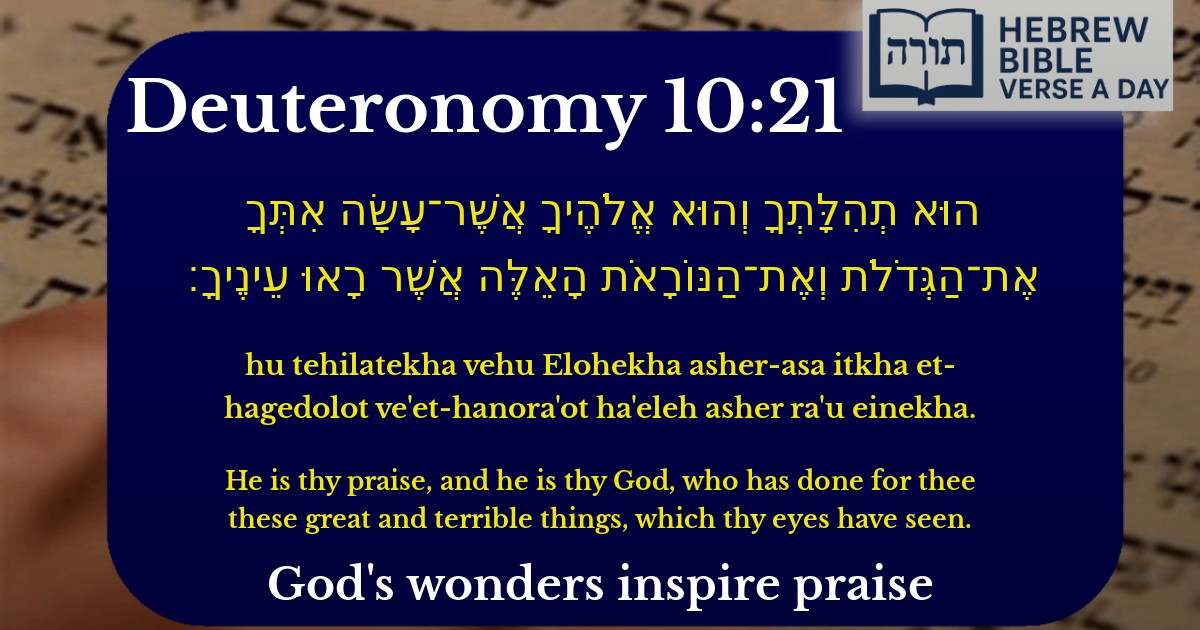Frequently Asked Questions
Q: What does 'He is thy praise' mean in Deuteronomy 10:21?
A: The phrase 'He is thy praise' means that Hashem (God) is the source of all our gratitude and the One we praise for the miracles and kindness He performs for us. Rashi explains that our praise to God comes from recognizing His great deeds, like the Exodus from Egypt and the giving of the Torah, which our eyes have witnessed.
Q: Why does the verse mention 'great and terrible things' in Deuteronomy 10:21?
A: The 'great and terrible things' refer to the miracles and wonders Hashem performed for the Jewish people, such as the Ten Plagues, the splitting of the Red Sea, and the revelation at Mount Sinai. The Rambam teaches that remembering these events strengthens our faith in God and reminds us of His constant providence.
Q: How can we apply Deuteronomy 10:21 in our daily lives?
A: We can apply this verse by recognizing Hashem's kindness in our lives and expressing gratitude through prayer and mitzvot. The Talmud (Berachot 54a) teaches that one must recite a blessing (Birkat HaGomel) after experiencing a miracle, reinforcing the idea that we must always acknowledge God's wonders.
Q: What is the significance of 'which thy eyes have seen' in this verse?
A: The phrase emphasizes that the Jewish people personally witnessed God's miracles, making their belief unshakable. The Midrash (Sifrei Devarim) explains that firsthand experience creates a stronger connection to faith than hearing stories alone, which is why the Torah repeatedly reminds us of what we saw.
Q: Why is Deuteronomy 10:21 important in Jewish tradition?
A: This verse is important because it summarizes the foundation of Jewish belief—recognizing Hashem as our God and praising Him for His miracles. The Sages derive from this verse that gratitude (hakarat hatov) is a key principle in Judaism, as seen in daily prayers like Modim in the Amidah, where we thank God for His wonders.


Understanding the Verse in Context
The verse (Devarim 10:21) appears in Moshe Rabbeinu's exhortation to Bnei Yisrael, reminding them of Hashem's greatness and their obligation to serve Him. The phrase "הוּא תְהִלָּתְךָ" ("He is thy praise") emphasizes that all praise and gratitude belong exclusively to Hashem, as He alone orchestrates the "great and terrible things" witnessed by the Jewish people.
Rashi's Commentary
Rashi explains that "הוּא תְהִלָּתְךָ" means that Hashem is the sole source of Israel's praise—when we recount His miracles and kindness, we bring honor to His name. The "great and terrible things" refer to the open miracles in Egypt, at the Red Sea, and in the wilderness, which demonstrated His absolute sovereignty.
Rambam's Perspective
In Moreh Nevuchim (Guide for the Perplexed 1:64), Rambam teaches that recognizing Hashem as "thy praise" is foundational to true worship. By internalizing His miracles ("which thy eyes have seen"), one achieves a deeper understanding of Divine providence (hashgacha pratit), reinforcing emunah.
Midrashic Interpretation
Halachic Implications
The Sefer HaChinuch (Mitzvah 418) derives from this verse the obligation to recite daily praise (e.g., Pesukei DeZimra), ensuring we never forget Hashem's miracles. The phrase "which thy eyes have seen" underscores that firsthand witnesses must transmit these accounts to future generations (mesorah).
Kabbalistic Insight
The Arizal (in Likutei Torah) notes that "הוּא תְהִלָּתְךָ" hints at the unification (yichud) of Hashem's Name through praise—when we acknowledge His greatness, we draw down Divine light (shefa) into the world.